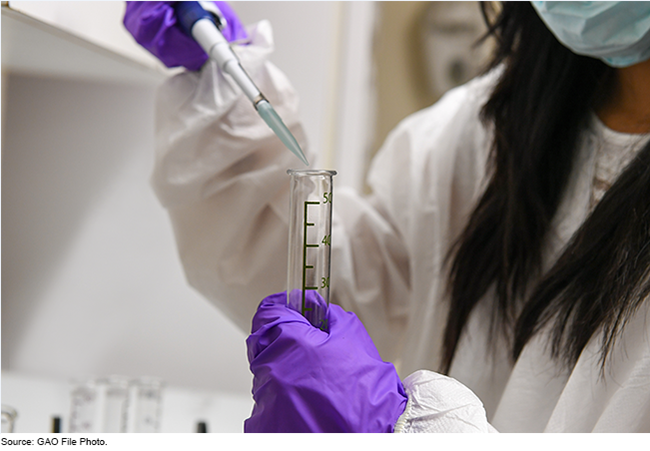CARES Act: Experts Identified Safeguards to Help Selected HHS Agencies Protect Against Potential Political Interference
Fast Facts
Four Health and Human Services agencies had key roles in the federal COVID-19 response. Our prior reports noted shortcomings to that response, including possible political interference.
Our panel of government, academic, and non-profit experts identified steps agencies can take to protect against such interference:
Set agency policies to prohibit interference and allow transparency in addressing allegations
Train agency staff on how to implement policies
Use advisory committees for independent recommendations on scientific matters
HHS is working to address our related recommendations from last year. We will continue to monitor its progress.

Highlights
What GAO Found
Department of Health and Human Services (HHS) agencies—including the Centers for Disease Control and Prevention (CDC), the Food and Drug Administration (FDA), the National Institutes of Health (NIH), and the Administration for Strategic Preparedness and Response (ASPR)—have been at the forefront of the federal government's response to the COVID-19 pandemic. Like most federal agencies, HHS leadership consists of both political appointees and career officials who work together to oversee agency operations and implement the administration's policy priorities. Political involvement or undue external influence becomes interference when it seeks to undermine an agency's impartiality, nonpartisanship, and professional judgment, according to the National Academies of Sciences, Engineering, and Medicine.
Experts participating in a roundtable convened by GAO identified safeguards in three areas that could help selected HHS agencies protect against potential political interference.
Safeguards Identified by Experts to Help Selected Department of Health and Human Services Agencies Protect Against Potential Political Interference

Selected HHS agencies have taken, or are in the process of taking, steps related to some of these safeguards. For example, HHS officials told GAO that the department is updating its existing scientific integrity policy, as required by a presidential memorandum issued in January 2021. According to officials, the updated HHS policy will include specific provisions prohibiting political interference and clear procedures for reporting and handling allegations of political interference, among other things. In another example, HHS has designated an interim scientific integrity official dedicated to ensuring scientific integrity at HHS.
While establishing safeguards against potential political interference is important, experts noted no agency is fully insulated from political influence and there is an appropriate role for political appointees and elected officials in agency processes. For example, experts told GAO it is appropriate for a political appointee or elected official to encourage an agency to expedite or prioritize a project. However, experts said it would be inappropriate to exert influence in a manner that interferes with the scientific integrity of the process or seeks to distort or misuse the science behind a decision.
Why GAO Did This Study
Recent reports have identified shortcomings in HHS's response to the COVID-19 pandemic, including allegations of political interference. In April 2022, GAO made recommendations to HHS and agency heads, including that they develop procedures for reporting and addressing allegations of political interference and train staff on how to report such allegations. This report examines further actions selected agencies—CDC, FDA, NIH, and ASPR—could take to protect against such interference. GAO selected these agencies because of the key roles they played in the COVID-19 response.
GAO convened a roundtable of 11 experts to discuss actions selected HHS agencies could take to protect against potential political interference. GAO contracted with the National Academies of Sciences, Engineering, and Medicine to help identify individuals with expertise in this topic area. The selected experts represented a range of perspectives and experiences, including working in the federal government; various academic areas, including political science; and the non-profit sector. GAO also reviewed federal guidance related to scientific integrity and interviewed HHS officials.
Recommendations
HHS is taking steps to address the recommendations GAO made in April 2022. For example, HHS is updating its scientific integrity policy to include specific provisions prohibiting political interference, among other things, and developing training for staff. GAO will continue to monitor implementation.
